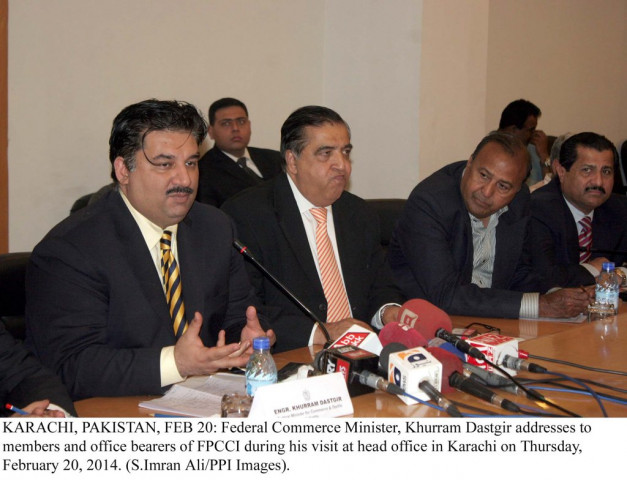Textile exporters dive into capacity tax controversy
‘Tired of waiting’ for promised refunds, apprise commerce minister of woes.

Commerce Minister Khurram
Dastgir Khan (L) addressing the members of FPCCI in Karachi on Fenruary 20, 2014. PHOTO: PPI
The capacity tax controversy surrounding the beverage industry became an embarrassment for the government on Thursday as cash-strapped textile exporters questioned the way economic affairs are being run in the country.
Holding press clippings, major exporters, who met Commerce Minister Khurram Dastgir Khan at the Federation of Pakistan Chambers of Commerce and Industry (FPCCI) office, linked the subject to their own financial woes.
“We are tired of waiting,” said Shabbir Ahmed, Pakistan Bedwear Exporters’ Association chairman. “Refunds worth billions of rupees are stuck with the Federal Board of Revenue (FBR) but no one is ready to even listen to us.”
“On the other hand, government officials have all the time to listen to beverage makers who have caused a shortfall of Rs7 billion in tax collection.”
To facilitate textile exports, the biggest foreign exchange earners for the country, the government has basically exempted them from paying sales and income tax.
But, this exemption works in the shape of a zero-rate regime, where tax is collected from textile makers and refunds are handed out only to genuine exporters.
However, this arrangement has created further problems for the industry as refund claims are pending since 2006. A meeting between textile makers and FBR officials is held every few days but without any result.
Bedwear exporter Ahmed said his association alone has overdue claims of more than Rs2 billion. “Obviously, this is a result of mismanagement. When tax officials, literally, gift Rs7 billion to beverage makers how do you expect them to pay us?”
Unlike the widely held perception, textile industry is continuously being ignored by policymakers, causing financial problems to many companies, he said.
“As a matter of fact, our policy makers are not even properly informed. They say GSP Plus scheme is available for the next 10 years. The truth is that we can avail it till 2017,” he said.
About the apathy of the government, he said the finance minister hasn’t spared time to meet the textile industry representatives despite multiple requests.
“Situation is such that even the interference of the FBR chairman is not enough to solve refund cases. This has personally happened to me,” he said.
On his part, Dastgir said the government will redo the tariff structure and SRO regime in the next budget to solve taxation issues and increase exports. The capacity tax on beverage industry, which has forced many small companies to either cut production or shut down plants, is emerging as a serious challenge for the government.
In its last budget, the government levied a fixed annual tax of Rs4.7 million per spout. The FBR had negotiated the taxation regime with two multinational companies upon the latter’s assurance that revenue would increase by 25%.
Till January 2014, the industry was supposed pay Rs4.2 billion as net tax whereas the FBR has only collected 50% of that amount, industry people say.
Capacity tax split the industry with smaller bottlers voicing concerns about undue financial burden on their small-scale operation. According to a rough estimate, around 95% of the beverage market is under control of two multinational companies.
Under the capacity tax, companies from Pakola in Karachi to Murree Brewery in Rawalpindi have been seriously affected with their sales at less than installed capacity.
Published in The Express Tribune, February 21st, 2014.
Like Business on Facebook, follow @TribuneBiz on Twitter to stay informed and join in the conversation.



















COMMENTS
Comments are moderated and generally will be posted if they are on-topic and not abusive.
For more information, please see our Comments FAQ